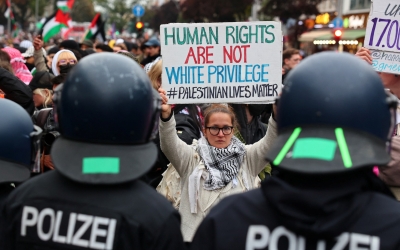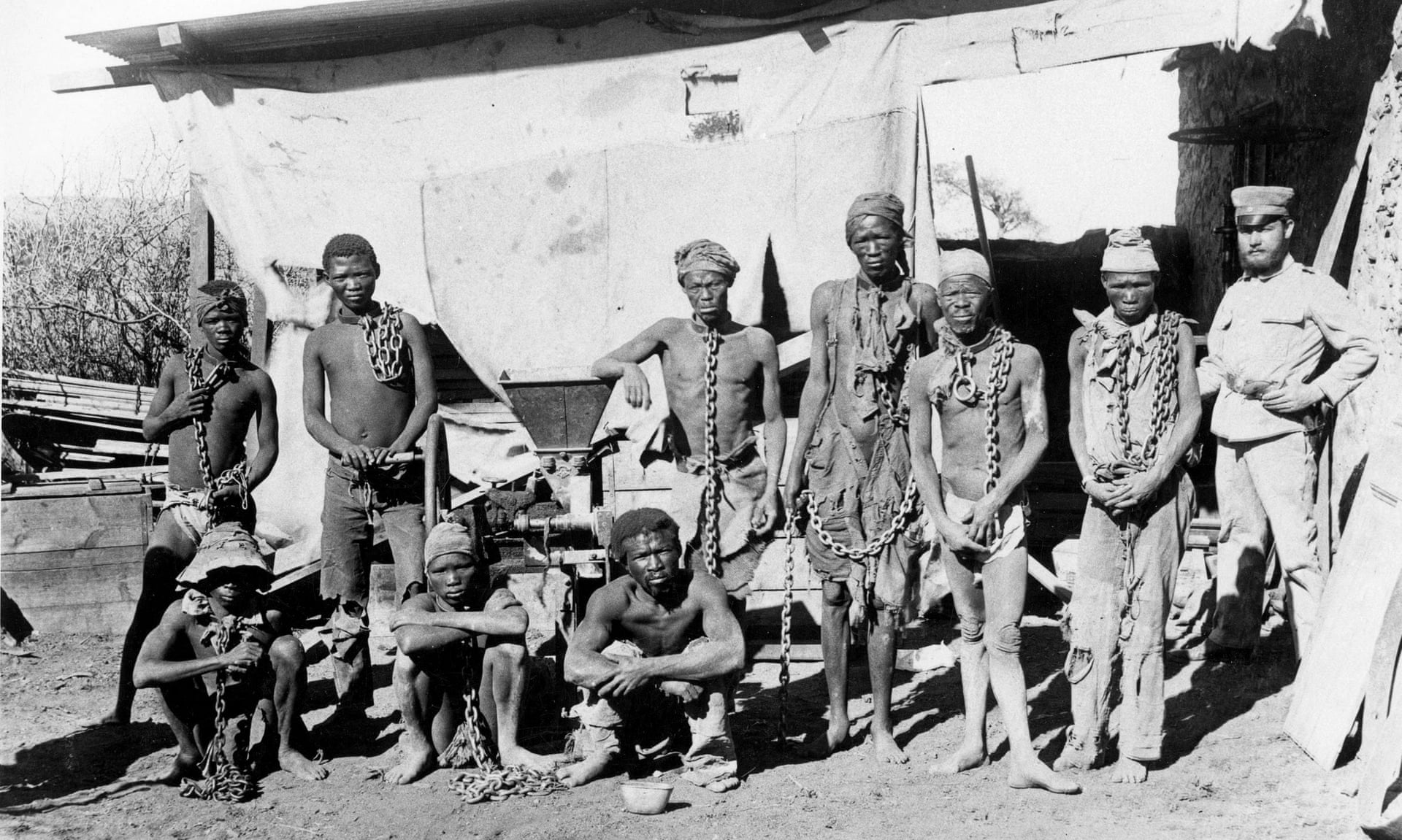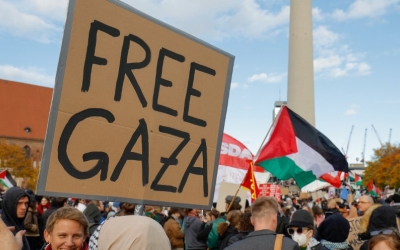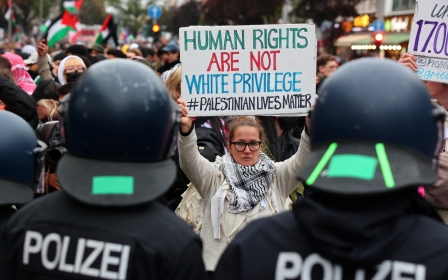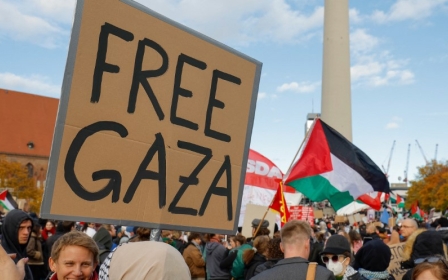What is behind Germany's complicity in Israel's Gaza genocide
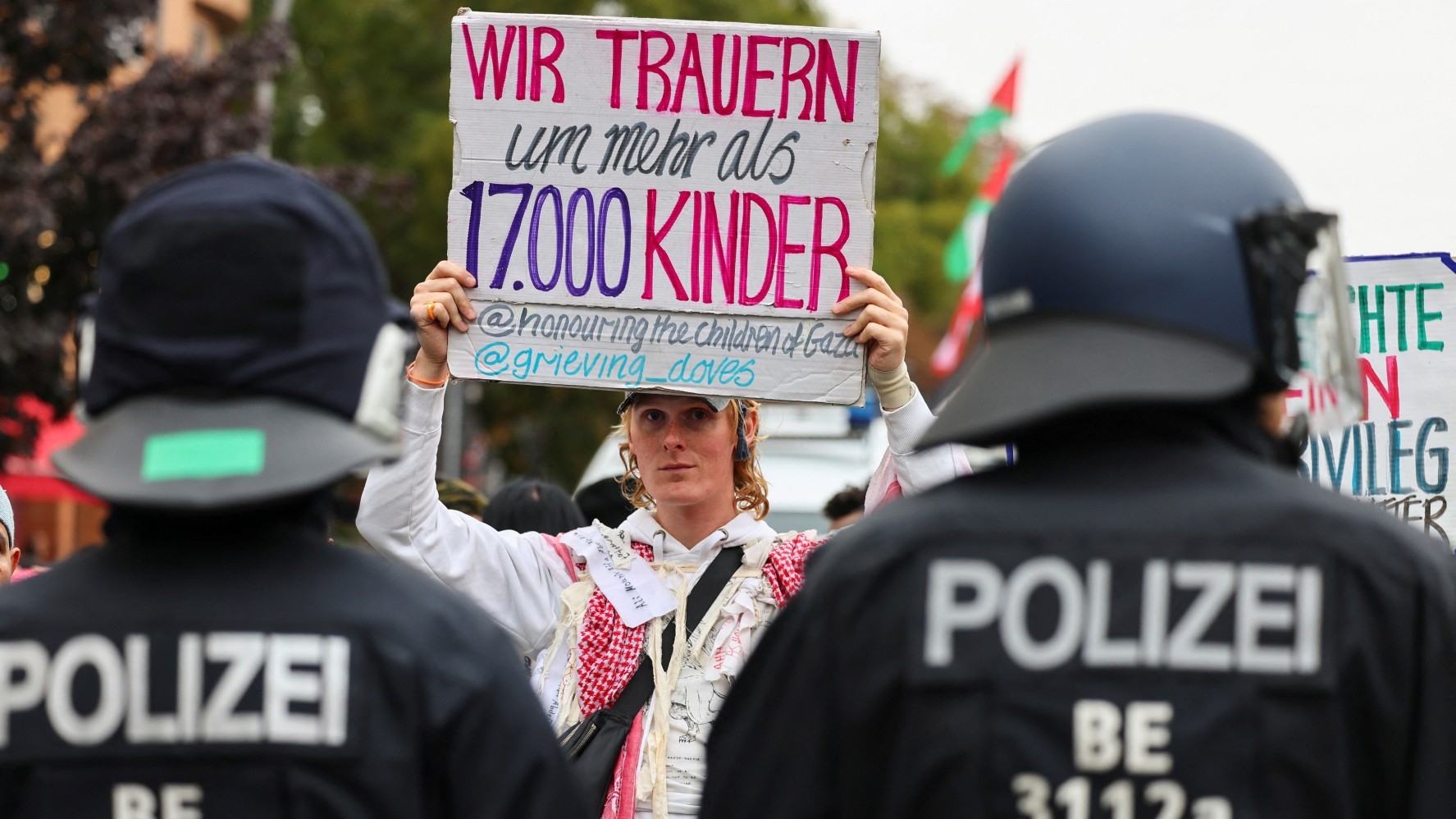
Two weeks ago, German Foreign Minister Annalena Baerbock defended Israel's killing of Palestinian civilians during a parliamentary address.
The UN special rapporteur on Palestine, Francesca Albanese, swiftly condemned her remarks and warned that if "Germany decided to stand with a state that is committing international crimes, it is a political choice, but it has also legal implications".
This incident is simply the latest example of Germany's enthusiastic support of Israel's campaign of extermination in Gaza.
Many have rightly criticised Germany for its pro-Israel stance and repressive measures that include censorship, arrests of activists, police raids, banning the keffiyeh in schools, and crackdown on pro-Palestine protests, citing its historical guilt.
More than a year later, Germany has remained at the "only...place [it] can be... Israel's side", as Chancellor Olaf Scholz pledged after 7 October 2023.
New MEE newsletter: Jerusalem Dispatch
Sign up to get the latest insights and analysis on Israel-Palestine, alongside Turkey Unpacked and other MEE newsletters
To understand why Germany would go to such lengths - even risking legal repercussions for its complicity - we must look behind its official claims and towards the actual driving forces behind its unreserved backing of Israel's slaughter of the Palestinian people.
Unresolved past
While being proud of presumably having learnt lessons from its history well, Germany is caught in an unresolvable dilemma that is exposed by supporting every new step of Israel's genocide, ethnic cleansing, colonisation, and invasion of sovereign countries.
In a nutshell, the official twofold argument runs like this: first, Germany has perpetrated the Holocaust of the European Jews, which means there is a kind of collective original sin that all subsequent German generations inherit; second, learning its lesson means that Germany must wholeheartedly support Israel in every conceivable way, regardless of the cost.
Germany seemingly has no choice: its dark legacy obliges the country to support Israel whatever it does. However, this narrative, which Germany has told both its own citizens and the world for decades, is far from convincing.
A closer look reveals that Germany's supposed Vergangenheitsbewältigung, a term that is supposed to suggest that Germany has come to terms with its past, is not even partly true.
By reducing the entirety of its brutal history to the singular crime of the Holocaust, Germany has failed to account for its settler-colonial violence against other people and, therefore, has not learnt any lesson at all.
Moreover, it is this glaring omission from its historical reckoning that has allowed Germany to prescribe as its remedy for past wrongs the imperative of supporting a racist and belligerent settler-colonial regime.
Amid a rising death toll, William Faulkner's famous line, "The past is never dead. It's not even past", perhaps best encapsulates the lesson Germany must learn as a result of its complicity in the ongoing genocide in Gaza.
A simple strategy
By absolutising the Holocaust, Germany has tried to absolve itself of responsibility for other historical crimes.
In claiming the Holocaust to be a breakdown of civilisation - an allegedly unexplainable, unique and unrivalled event in human history - Germany has spent decades pretending that the country has come to terms with its history.
By reducing the entirety of its brutal history to the singular crime of the Holocaust, Germany has failed to account for its settler-colonial violence and has not learnt any lesson
This simple, strategic move purported to present the image of a civilised, enlightened and peaceful country whose history was abruptly interrupted by 12 years of fascism.
However, this narrow view has never made any sense: Nazi Germany did not fall from the sky in an unprecedented breakdown of civilisation.
It did not even come as a sudden and unexpected surprise. But as Karl Polanyi said in 1944, it was a consequence of the irrationality of the West's liberal civilisation.
The transformation of societies into self-regulating markets in the 19th century led to the destruction of their social fabric.
Follow Middle East Eye's live coverage for all the latest on the Israel-Palestine war
As a result, counter-movements emerged, trying to protect society. While the US reacted progressively with the New Deal, large parts of Europe descended into fascism, and Germany into Nazism as reactionary counter-movements.
Likewise, the German people's deep-rooted fascism was an outcome of its brutal settler-colonialism in Africa, which lasted from 1884 to 1914.
This period created a racist, white supremacist mentality that eventually came home to the motherland to spread and become normality. It inspired the Nazi concept of the German Übermensch as superior to Slavic peoples, Russians, Jews and many others, who were all declared to be Untermenschen.
These ideas were thus not simply an invention of the Nazis, nor were they first applied to European Jews. In fact, it was Germany's settler-colonial attitudes towards Africans that enabled it to draw the boundaries between "us", the German race, and "them", the subhuman Nama and Herero in Namibia who became victims of Germany's first genocide in the early 20th century.
In contrast to the Holocaust during the Third Reich, the genocide of the Namibian peoples has never played any role in Germany's selective collective memory.
This comes as no surprise as doing so would finally lead to the collapse of its Vergangenheitsbewältigung house of cards.
In contrast to the Holocaust during the Third Reich, the genocide of the Namibian peoples has never played any role in Germany's selective collective memory
Neither would Germany be able to maintain its self-image of having learnt from its history, or continue to ignore and conceal the tens of thousands of indigenous victims of its eliminationist politics during the time of the Wilhelmine Empire, nor to deny - or treat as of minor significance, if any - the 27 million victims of the Nazi invasion of the Soviet Union.
Germany's strategy of isolating the Nazi Holocaust from this bloody history has long proven successful. But now, in the face of its support for one of the worst genocides in human history, the masquerade is over.
Like much of the world, German society, which includes Palestinians and anti-Zionist Jews, has watched in horror a live-streamed genocide in Gaza every day for 12 months: the daily massacre, torture, and starvation of a civilian indigenous population, the majority of them women and children.
No longer will they believe the official stories about German guilt and its obligation to support the Israeli regime. Nor will they forget the outright false claims of Baerbock and, later, Scholz, who helped manufacture consent for Israel's war by claiming to have watched a nonexistent video of Hamas fighters raping Jewish women, a claim for which not even the UN found convincing proof.
There seems to be no end to Germany's Nibelungentreue - Germany's version of a "special relationship" with the Zionist regime - and utter disregard for Palestinian life.
Institutional failure
The German government's dehumanisation of Palestinians is so deeply entrenched in its policies that it not only funds Israel's war crimes but goes so far as to prevent severely injured children from receiving treatment in Germany, viewing them as a "security threat".
De-humanising non-white human beings, declaring human beings to be animals, the practice of collective punishment, starving people to death, letting them die of thirst, and so forth – all of which Germany has accepted, supported, and defended for more than a year now, seems to come out of the textbook of its own annihilation of the Nama and Herero as well as the Nazis' war of extermination in Eastern Europe and Russia.
This Übermenschentum mentality is still pervasive, though its existence is officially denied, and thus, its roots have gone unexamined. What once was the indigenous people in Namibia or the East are now the Arabs in general, Palestinians in particular.
Yet giving up one racist ideology to wholeheartedly support another one politically, financially, militarily, and diplomatically is not coming to terms with one's own history.
Instead of becoming humble in the face of its devastating and violent history, Germany needs and supports the Zionist colony, from which it also learns and profits.
Its complicity in genocide shows that the past is not even past in Germany. The selective engagement with the past that solely focuses on the genocide of white European Jews has led the state and society nowhere.
It is almost compulsively repeating its unprocessed, repressed, and unresolved colonial past. In this sense, all critical actors, organisations or institutions in Germany have failed to an unimaginable extent.
Chief among them is the federal government, whose unreserved support for Israel includes a chancellor, foreign minister, and an ambassador to Israel, all of whom continue to deny Israel's crimes in the face of genocide.
In addition, after the government adopted and circulated the IHRA definition of antisemitism in September 2017 by cabinet resolution, the Bundestag (parliament) itself committed to the definition in a resolution in 2018.
The same Bundestag is also expected to adopt a resolution this autumn titled, "Nie wieder ist jetzt: Jüdisches Leben in Deutschland schützen, bewahren und stärken", or "Never again is now: Protecting, preserving and strengthening Jewish life in Germany", which of course is to be welcomed - as the life of every single human being should be protected in a democracy.
However, just like Germany has restricted the vast group of victims of Nazism to only one to serve as the lynchpin of its collective remembrance, so again does the democratically elected Bundestag.
While political parties and individual politicians, together with the media, are spreading anti-Arab and anti-Muslim propaganda, Germany has reduced the universalist anti-fascist slogan "Never again" to a political instrument that only privileges one group while leaving all others unprotected.
In this case, Palestinians are clearly not deemed deserving of the demand that nobody should ever be a victim of fascism and genocide.
A reckoning
Several German governmental and academic elite institutions were quick to repeat Israeli propaganda at the start of the genocide, declaring to stand firmly at Israel's side.
Germany's churches, which seem to view themselves as the vanguard of moral superiority, have not said a word about Israel's genocide
Since then, we have not read a word of these elite institutions about up to the 200,000 or so killed if we follow the July 2024 estimates of The Lancet.
While universities have cancelled invited guests and elite institutions have dismissed guest professors, others have raised the budget for partnerships with Israeli universities and research centres and set up new cooperation programmes, knowing that they are an intrinsic part of the occupation and genocide.
Germany's churches, which seem to view themselves as the vanguard of moral superiority, have not said a word about Israel's genocide, not even when Palestinian Christians have been attacked or killed.
Even for them, Palestinians do not seem to be white enough to be worth defending.
The German Ethics Council, which claims to "deal with the great questions of life" and whose opinions and recommendations "provide orientation for society and politics", did not mention a single word within this horrifying year.
Yet if genocide doesn't merit a discussion, especially for German society that obviously receives its orientation from people ready to support genocide, then what does?
One might also mention the Deutscher Kulturrat and the media as the great protectors of culture who, years ago, rightly voiced horror in the face of the Islamic State group destroying Palmyra and other cultural sites, but now do not seem to care at all about Israel's barbaric destruction of the great heritage sites in Gaza.
Double standards
A look at the German "quality media" reveals even more. It is no exaggeration to state that all have horrendously failed during the last year.
Instead of doing their job, criticising or correcting the government and the political elites, offering alternative perspectives and stimulating an honest debate, they have sung the song of the powerful.
Only occasionally did they report on the slaughtered Palestinians, and when they did, it was in vile language and not without reference to the Holocaust or German history.
All that cannot simply be explained by "double standards". Rather, we see a deeply-rooted settler colonial mindset in Germany's institutions and organisations that have not been confronted in a century.
The politically prescribed culture of remembrance of the Nazis' genocide - and strategic definition of white European Jews as the only group of victims worth defining this collective memory - has made Germany an unreserved supporter of a regime that has been a state of terror from the very first beginning.
This is a state of white and religious supremacy, a perpetrator of ethnic cleansing and apartheid that finally has turned, like so many settler-colonies before it, into a fascist genocidal one.
As long as Germany refrains from confronting its settler-colonial traditions and mentality, it will be stuck in supporting genocide, which, according to Raphael Lemkin, is the worst of all crimes, failing once again to overcome its own history of annihilating the Other.
The views expressed in this article belong to the author and do not necessarily reflect the editorial policy of Middle East Eye.
Middle East Eye delivers independent and unrivalled coverage and analysis of the Middle East, North Africa and beyond. To learn more about republishing this content and the associated fees, please fill out this form. More about MEE can be found here.



